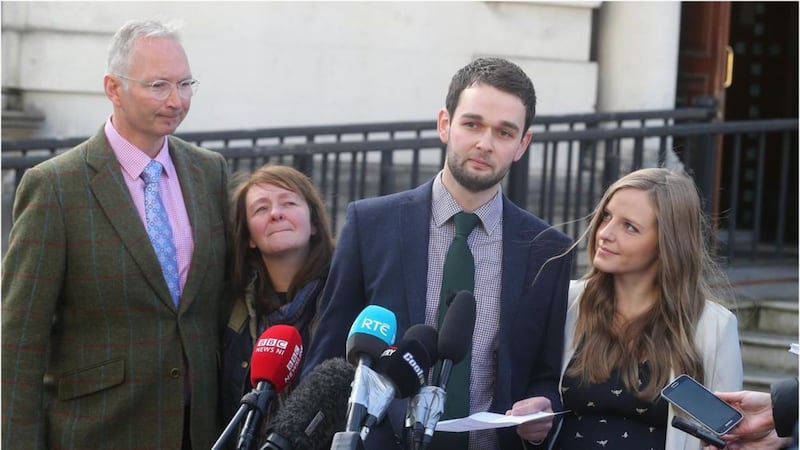A WHOLE new tier of anti-discrimination law is developing in Northern Ireland and this week's gay cake appeal ruling has given it a significant boost.
It is now unquestionably wrong to deny goods, services or employment to someone on the basis of any "ongoing political debate". Do not feel embarrassed if you do not know what this means. Nobody knows what it means and we will spend the rest of our lives figuring it out.
Ashers Bakery was found guilty last year of discriminating against campaigner Gareth Lee on the grounds of sexuality and "political opinion".
It is the second charge that makes this so problematic. The Equality Commission added political opinion to its case so that Ashers could not get away with claiming it acted against the cake but not the customer.
In the event, the bakery had no luck with that argument. The original trial judge noted that gay marriage and gay people are "inextricably linked" and thus found direct discrimination against Lee on the grounds of his sexuality.
The three appeal judges this week, including the Lord Chief Justice, used copious law and precedent to uphold this finding. Their argument was so watertight it had an almost comic quality - for instance, they showed that everyone in a gay marriage is gay.
The judges also gave short shrift to Ashers' appeal on human rights grounds. The bakery had cited the rights to freedom of conscience and freedom of expression. On freedom of conscience, the judges found anti-discrimination law over-rides human rights law in the provision of goods and services - both sets of laws make this crystal clear.
On freedom of expression, the judges noted this was actually a case of freedom not to express, known in rights law as `forced speech', which was too grandiose a claim to make about icing a cake. This is where the appeal court made its widely-reported remarks about "witches on a Halloween cake" not implying belief in witches.
Because the Equality Commission has been victorious on all these points there was never any need to invoke political opinion. Unfortunately, it did and it has been victorious on that as well.
Much of Northern Ireland's anti-discrimination law is grounded in the Good Friday Agreement. Denying goods and services to gay people was specifically banned under direct rule in 2006.
The concept of discrimination on the grounds of political opinion has a very different pedigree. It dates back to the 1973 law enacting the Sunningdale agreement, where it was apparently used as a short-hand for `unionist or nationalist'. The term cropped up again in 1976 fair employment legislation and has been copied into other laws on several occasions since but no attempt has ever been made to define it, other than to clarify it does not cover support for violence. Instead, judges have been left to decide what it means on a case-by-case basis.
The pedigree for this dates back to a 1994 case involving public sector union Nipsa, where a Belfast judge literally looked up "political" in the Shorter Oxford Dictionary and declared it meant "an opinion relating to the policy of government and matters touching the government of the state".
In last year's gay cake trial, the judge cited this as including gay marriage because Stormont had debated it, even though gay marriage remains unlawful in this state.
That was a County Court judgement so it did not set a legal precedent, even in Northern Ireland. However, now it has been fully upheld by the appeal court, this verdict on political discrimination has become UK-wide case law. The Christian Institute, which funded Ashers' appeal, has shot itself in the foot.
In February this year, leading gay rights campaigner Peter Tatchell withdrew his support for the Equality Commission case because he felt the political opinion aspect infringed vital freedoms and could be exploited by extremists. He raised the hypothetical case of a Muslim printer forced to publish cartoons of Muhammad.
The courts believe there is no danger of this because businesses are only being asked to make their opinions clear and apply them equally to everyone. For example, no political slogans from the Christian baker; no religious imagery from the Muslim printer.
In reality, nobody can know where such an open-ended discrimination law will lead. Two years ago, during the row over welfare reform, Sinn Féin's political director at Stormont, Leo Green, settled an employment claim for political discrimination against his own political party. Who could have foreseen that in 1976?









